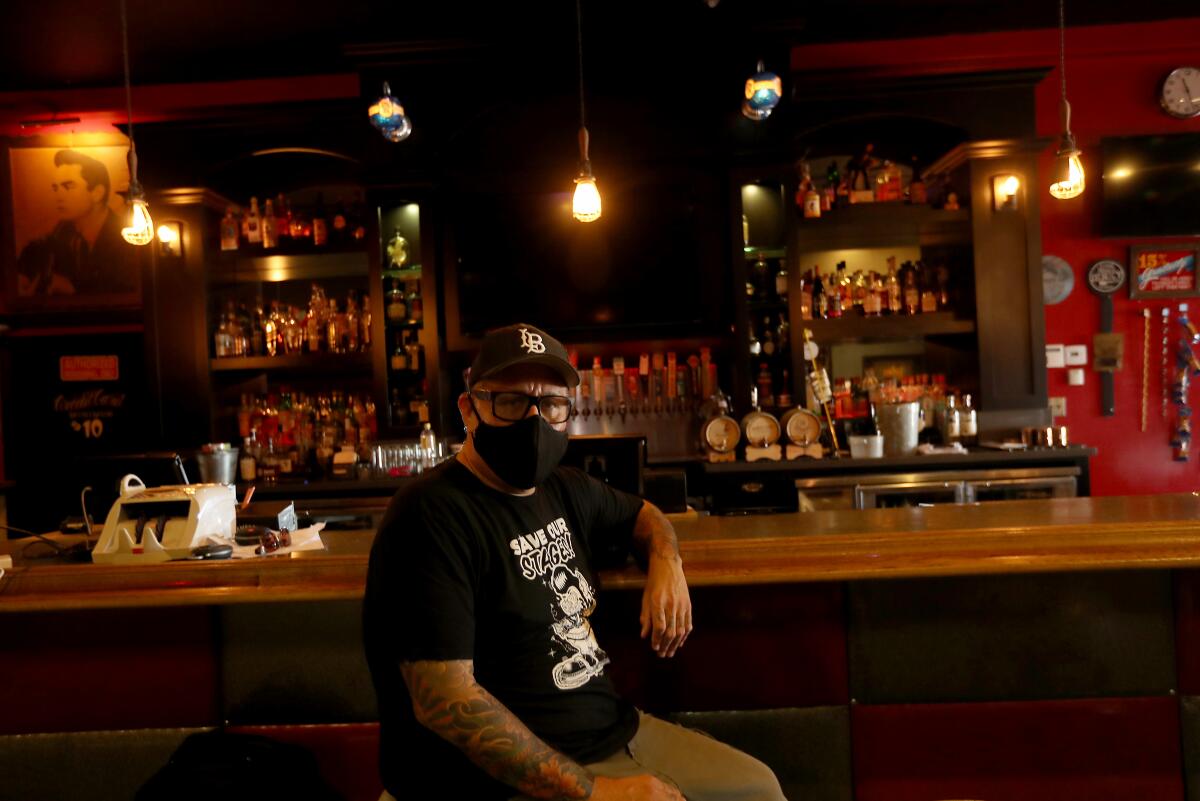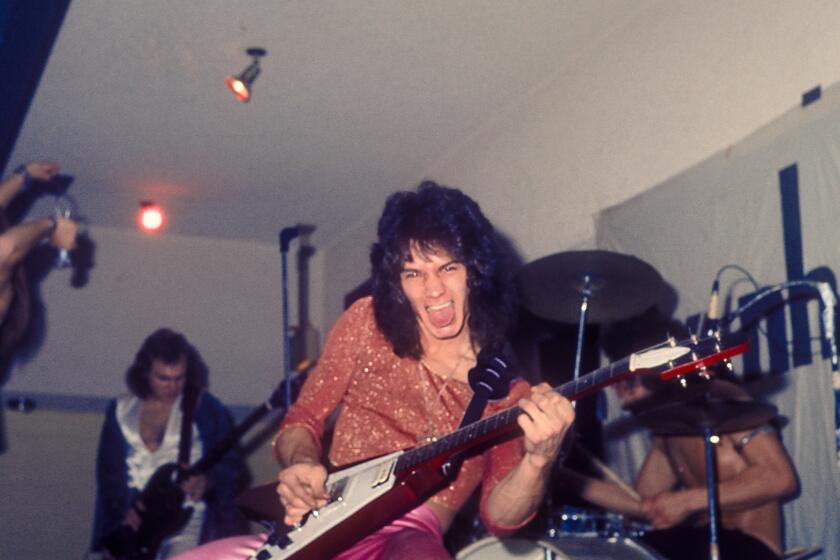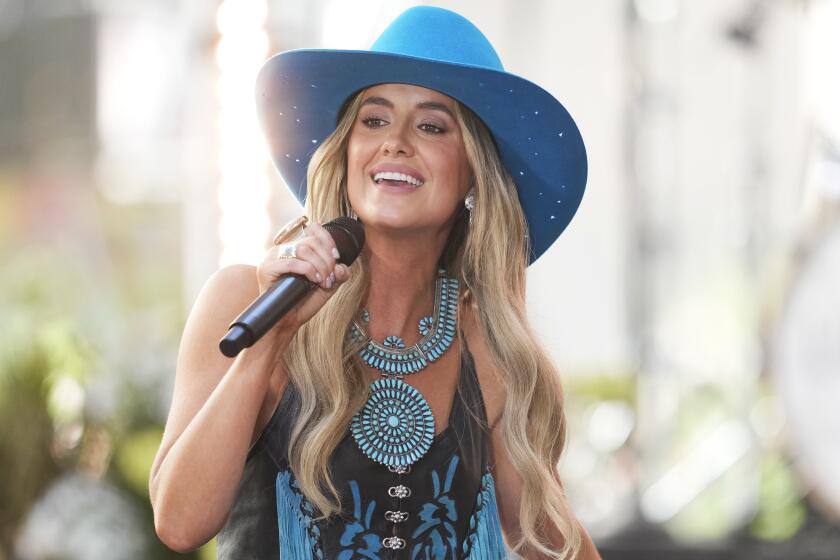With COVID-19 stimulus stalled, L.A. clubs face doomsday scenario: ‘We’re in the deep end, drowning’

Over the summer, Dave Grohl often drove around L.A. with his 14-year-old daughter, just to have a change of scenery from lockdown. Before COVID-19 struck, the Foo Fighters frontman expected to be touring to mark the band’s 25th anniversary this year. But one night, as the two passed by the boarded-up Troubadour in West Hollywood, Grohl’s daughter turned to him and, as he recounted, grew melancholy.
“Oh, no, the Troubadour,” she told him. “God, it’s so sad, I hope it survives.”
“I had no idea she knew about its history,” Grohl said in a phone interview over the weekend. “Even to a 14-year-old, it was so important to her that one day, it still exists.”
On Saturday night, Foo Fighters posted a pretaped live set from an empty Troubadour to raise funds for the National Independent Venue Assn. and its lifeline to imperiled clubs. Shuttered venues, Grohl said, don’t just affect musicians currently on hiatus. “They’re for the next generation, like my daughter,” he said.
Among the bands that made their mark on Slash Records were X, the Germs, Los Lobos, the Blasters and the Violent Femmes.
Sadly, many similar venues might not survive the year. In the absence of any further federal relief like the now-on-hold Save Our Stages Act measure, independent music venues face increasingly dismal choices.
Do they take out onerous business loans and risk total personal ruin later if the COVID-19 pandemic persists another year? Do they throw in the towel now, when a vaccine or stimulus bill might be just around the corner in a Biden administration?
“I call it a crapshoot from hell,” said Christine Karayan, general manager of the Troubadour. “You can make a couple dollars from merch and live-streaming, and that’s better than nothing. But you can’t sustain a venue on that.
“I know everyone is doing their best. But has everybody just lost their minds?”
Even just a few weeks ago, venue owners and industry advocates were optimistic that help was on the way. The Save Our Stages Act, championed in the Senate by Sens. Amy Klobuchar (D-Minn) and John Cornyn (R-Texas), would provide $10 billion in grants to local music venues to pay for expenses like rent, utilities and insurance not covered under the Paycheck Protection Program.
In September, the Democratic-led House updated its already-passed HEROES Act to include Save Our Stages’ measures. An industry used to expecting the worst was hopeful that the bill would make it into a second round of COVID-19 relief measures.
Then summer came and went, and optimism for a relief bill got subsumed into election acrimony and a Supreme Court nomination fight. “I have instructed my representatives to stop negotiating until after the election when, immediately after I win, we will pass a major Stimulus Bill that focuses on hardworking Americans and Small Business,” President Trump wrote in a tweet on Oct. 6.
“Small venues were some of the first to close their doors, and I know the prospect of re-opening is becoming even more difficult as this pandemic continues to grip the country,” Sen. Klobuchar said in a statement to the Times. “But we can’t let the music die. Save our Stages has growing bipartisan support and was included in the latest relief package that passed the House of Representatives. Senator Cornyn and I continue to work with colleagues on both sides of the aisle to ensure aid for small venues is included in any pandemic relief package.”
A rep for Cornyn said, in a statement taken from a Facebook Live chat, “My hope is that we’ll come together and pass one last bill at least before the election… It will include the Save Our Stages Act.”
For industry pros fighting for the bill, it was a sucker punch just when they’d allowed themselves some hope.
“We feel abandoned right now,” said Audrey Fix Schaefer, spokesperson for the independent venue association, which led the music industry’s advocacy for the legislation. “It has been a horrendous roller-coaster ride. Everybody predicted this would pass in July. People are selling their houses to not go under. We’re all exhausted and frustrated. Our system should be better equipped to come to the aid of those who need it.
“We’re in the deep end, drowning,” she added.
Eddie Van Halen, son of blue-collar immigrants, went to Pasadena High. David Lee Roth, his dad a doctor, attended Muir. Their meeting remade rock.
Several L.A.-area venue operators said they’re giving it until the new year to make existential decisions about whether to even stay in business. They said they’re starting to feel like they’re in an airplane with a blown-out engine: suspended in midair, waiting for the drop.
“There was a minute where we had high hopes,” Karayan said. “But at what point do we have to cut our losses? Everybody’s already in with blood, sweat and tears. At some point, you have to stop the bleeding. Do I mortgage my house? Or do I lose everything?”
“I don’t know if we’re going to make it,” said Elizabeth Fischbach, who owns 1642, a bar on Echo Park’s southern edge that’s become a one-of-a-kind venue for jazz and vintage Americana acts. “I’m living off borrowed money, and some musicians have helped out generously. But it’s all running out. I haven’t paid my mortgage in six months. How much am I willing to go into debt for this, with nothing to show?”
“That’s the giant anxiety pill everyone swallows before bed,” said Alex Hernandez, owner of Long Beach’s two-decade-old punk stalwart Alex’s Bar. “What if I’m just paying rent for no reason? I already took out another business loan and borrowed more money than I paid to open this place. But when does it put my wife and three kids in a dangerous place with no savings to keep a roof over our heads?”
Even in an industry used to frantic problem-solving on tight budgets, the lack of government action to save an industry and cultural ecosystem worth billions has despaired and confounded them.
“I was shocked when it didn’t happen,” said Patrick Whalen, national director of We Make Events, another live-industry advocacy group representing venues as small as Frogtown’s Zebulon and as large as L.A. Memorial Coliseum. “But it’s a perfect storm: a horrible disease on top of an election on top of a Supreme Court justice passing. Overnight, the attention shifted. We had spent countless hours to motivate people who had already lost faith in government.”
“At our venue in MacArthur Park, in the community of Westlake, the median income is around $26,000. Music should be funded in this neighborhood, because art is a pillar of our society just like politics, education and religion,” said Allison Keating, executive director of the Levitt Pavilion Los Angeles, a nonprofit that before COVID-19 produced 50 free outdoor shows a year in the largely Latin American neighborhood.
“Music gives people hope. The justification for it is the same as for keeping art in schools and funding the NEA.”
Meanwhile, venues and activist groups are performing triage with whatever money they can raise. On Friday, the independent venue association kicked off the Save Our Stages Fest, a live-to-tape performance series on YouTube where acts played inside beloved — and empty — local venues around the country. Foo Fighters, YG, Marshmello, Demi Lovato and Phoebe Bridgers played at the Troubadour; the Teragram Ballroom, the Whisky a Go Go and the Hotel Cafe also hosted sets from Miley Cyrus and Finneas, among others.
Grohl hoped the festival would showcase how, without these small venues, the stadium shows he plays now wouldn’t have been possible.
“You have to learn to crawl before you run to Wembley Stadium, and the longevity of most artists’ careers is rooted in playing smaller venues in your early years,” he said. “You learn from those shows how to connect to audiences. If you bring that to a stadium stage, then you’re U2 or Freddie Mercury.”
Fundraising streaming sets have been a small lifeline for venues, along with merchandise sales, staff GoFundMes and whatever else they can scrounge up in the meantime. Live Nation and AEG, the two rival mega-corporations in touring, announced a new effort, #SaveLiveEventsNow, pushing for tax breaks and extended unemployment benefits for workers across the live industry.
But several venue owners say they’ve been frustrated with city and county governments’ guidance, and the whipsaw approaches to letting restaurants and other types of hospitality businesses resume service while they’re still shut down and can barely turn on the lights (or not: Electricity bills are still due in a pandemic).
“The city of West Hollywood has been beyond helpful to do whatever they can,” Karayan said. “But there’s been no real direction from the state, no answers for anything.”
“It just feels so dire,” Fischbach said. “I know there are so many other challenges in this state. But there is so much money in this city, I can’t imagine why we have to suffer so much.”

There are signs that a potential Biden administration might make Save Our Stages a priority in a bigger relief bill. The Biden campaign just released a new ad spotlighting the Blind Pig, a 50-year-old music venue in Ann Arbor, Mich., whose owner, Joe Malcoun, blames the Trump administration for failing to manage the pandemic and for ignoring small businesses like his. “We don’t know how much longer we can survive without any revenue,“ he says in the ad. “It makes me so angry. My only hope for my family and for this business and my community is that Joe Biden wins this election.”
On Saturday night, as the Foo Fighters’ virtual set streamed, the doors of the Troubadour were boarded over and silent. Pre-pandemic, hundreds of fans would have been there, clamoring for tickets or just to catch a glimpse of the band performing that night.
But for now, just like for the last eight months, there was nothing but traffic noise and the sense of doom that Grohl’s daughter felt passing by.
“I’ve imagined myself sitting at a Senate hearing, trying to convince them that music is necessary,” Grohl says. “Maybe reminding them that at one point, Barry Manilow was a huge part of their life, to try to relate to the idea that music makes life better. Washington needs to take a good, hard look at how dire the situation is, but also to look back on their own lives and remember how important music is to them. We have to protect that for the next generation.”
More to Read
The biggest entertainment stories
Get our big stories about Hollywood, film, television, music, arts, culture and more right in your inbox as soon as they publish.
You may occasionally receive promotional content from the Los Angeles Times.












